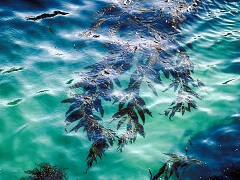Features
Kelp Biofuel Project
Date: 2017-09-05 10:02:05.0
Author: USC Wrigley Institute for Environmental Studies
 Pairing Marine BioEnergy’s engineering concepts with the marine facilities and biological expertise at USC, we are testing a system for cultivating kelp in the open ocean. If successful, this system may make it possible to farm kelp for biofuel at large scale.
Pairing Marine BioEnergy’s engineering concepts with the marine facilities and biological expertise at USC, we are testing a system for cultivating kelp in the open ocean. If successful, this system may make it possible to farm kelp for biofuel at large scale.
Giant Kelp (Macrocystis pyrifera) grows naturally in the coastal waters of California, and is part of a genus found in temperate waters worldwide. The kelp is renowned for its growth rates, with documented growth of up to 2-3 feet per day and mature lengths that can exceed 150ft. Considered the ‘Sequoia of the Sea’, giant kelp provides an essential habitat and food source for many marine species while sequestering carbon dioxide and producing oxygen as it grows. These characteristics and the fact that cultivation of kelp does not require land, freshwater or fertilizer resources have made kelp an attractive source of biofuel by the Department of Energy and private organizations since the 1970s.
Growing kelp in the open ocean, as opposed to in its native nearshore habitat, is a challenge. The variables kelp need are not found in one place: sunlight is at the surface, while essential nutrients are found in deeper waters. To successfully rear kelp in this environment will require cycling between different depths, a concept requiring new engineering approaches like those patented by Marine BioEnergy. Using autonomous moving structures to ‘depth-cycle’ kelp up and down each day, to the surface for light and to depth for nutrients, will potentially enable large-scale cultivation of this valuable resource.
The immediate focus of the USC Wrigley Institute’s scientists is testing whether this ‘depth-cycling’ is biologically viable for the kelp. Depth-cycling tests are being conducted in waters near USC’s marine facility on Catalina Island (the Wrigley Marine Science Center), using moored structures nicknamed ‘kelp elevators’. Led by USC faculty and staff, the project offers a unique opportunity for undergraduates to engage with experts in applied marine research. The results of these tests will establish a proof-of-concept for Marine BioEnergy, Inc.’s vision of large-scale open ocean kelp farming.
Upon successful proof-of-concept, Marine BioEnergy hopes to deploy larger test kelp farms in the open waters of the Pacific Ocean. The ultimate goal of Marine BioEnergy, Inc. is large underwater moving kelp farms that move between depths using autonomous submersible drones for the optimal balance of sunlight and nutrients, before extracting the kelp for fuel production. By combining decades-old kelp biofuel ideas with today’s technological innovations, large-scale kelp biofuel may finally become a reality.
About USC Wrigley Institute for Environmental Studies
The USC Wrigley Institute for Environmental Studies brings together all of the marine and environmental sciences at the University of Southern California, and its crown jewel is a unique marine lab on Catalina Island, the Philip K. Wrigley Marine Science Center.
For further information about USC Wrigley Institute for Environmental Studies, please visit the website here.
This article has not been tagged with keywords.
